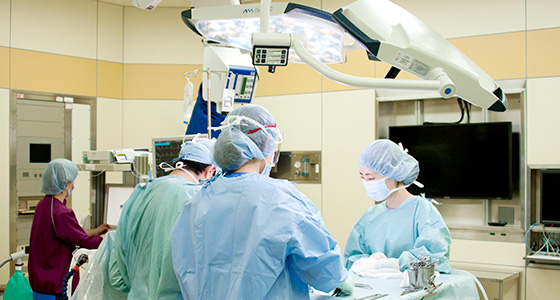- HOME
- Department
- Surgery
Surgery

(1) Overview
Our department primarily handles gastrointestinal diseases that require surgery, performing over 1,00 surgeries per year.*1 Specific conditions treated include gastric cancer, colon cancer, rectal cancer, esophageal cancer, liver cancer, pancreatic cancer, biliary tract cancer, gall stones, bowel obstruction, hernias, and anal diseases.
We also manage acute abdominal conditions requiring emergency surgery, such as appendicitis, upper and lower gastrointestinal perforation, strangulated bowel obstruction, and cholecystitis. The number of emergency surgeries performed in our department is approximately 120 per year.*2
- *1 From January to December 2024, we performed 1,126 surgical procedures.
- *2 From January to December 2024, we performed 125 emergency surgeries.
We have adopted robot-assisted surgery (Da Vinci surgery) for rectal cancer since 2018, for gastric and esophageal cancers since 2022, and for distal pancreatectomy and colon cancer since 2023.
Even if a patient visits our department without a confirmed diagnosis, we will refer them to the appropriate department as needed, based on their condition. In cases where chemotherapy or radiation therapy is necessary depending on the cancer stage, we work in close collaboration with the departments of medical oncology and radiation oncology. For recurrent cancer, we provide a wide range of treatment options, from chemotherapy to palliative care, depending on the patient’s condition.
(2) Policy
[Pursuit of Specialization and 24-Hour Emergency Care]
Striving for the Most Advanced and Cutting-Edge Surgical Treatment
Medical technologies are advancing day by day. In such a rapidly evolving field, our department is never satisfied with the status quo. We are constantly adopting new techniques, equipment, and surgical procedures in order to provide the most advanced and high-quality surgical care. In addition, our team includes numerous board-certiied and specialist surgeons who are continually pursuing greater expertise in the field of surgery.
Efforts Towards Establishing a Specilized Surgical Care System
Gastrointestinal surgery is undergoing a major transition from traditional open surgery to the era of laparoscopic surgery. Amidst this shit, our surgical department continues to enhance its expertise to provide the most advanced and high-quality surgical care. We have many board-certified specialists, including those certified by the Japan Surgical Society (Surgical Specialist), the Japanese Society of Gastroenterological Surgery (Gastroenterological Surgical Specialist), the Japan Esophageal Society (Esophageal Surgical Specialist), and the Japan Society of Coloproctology (Coloproctology Specialist).*3
- *3 As of February 2025
Responding to Surgical Emergencies 24/7
We proactively accept and treat patients requiring treatment even during nights and holidays, and have established a system that enables emergency surgeries to be performed 24 hours a day when necessary. Patients requiring urgent admissions are hospitalized according to the severity of their condtion, in units such as the ICU (Intensive Care Unit), HCU (High Care Unit) or the general ward.
(3) Our Strengths
Thorough Evaluation of Surgical Indications and Procedures
All surgical indications ad procedures for each case are thoroughly discussed during conferences twice a week that are attended by all members of the surgical department.. In cases where comparison with non-surgical treatments, such as endoscopic therapy, is necessary, decisions are made following discussions at a weekly joint conference with our Gastrointestinal Endoscopy and Hepato-Biliary-Pancreatic Medicine.
Furthermore, for advanced cancer cases initially deemed inoperable, the possibility of surgical intervention is reconsidered if favorable results are observed following chemotherapy or other non-surgical treatments.
Valuing Team-Based Approach
Our department places great importance on team-based medical care in our daily practice. We work closely not only with other departments within the hospital, but also with a wide range of healthcare professionals—including doctors, nurses, pharmacists, clinical engineers, radiology technicians, dietitians, physical therapists, social workers and clerical staff—who collaborate and share responsibilities according to their areas of expertise.
Within the hospital, the Nutrition Support Team (NST) specialists screens patients’ nutritional status and provides guidance on nutritional management. In addition, specialized teams such as the Palliative Care team and the Infection Control team conduct hospital-wide rounds to ensure comprehensive care and effective responses.
Sharing of medical information is especially crucial in team-based care. To ensure efficient communication, particularly in perioperative management, we utilize an electronic medical record system and clinical pathways (inpatient care plans).
SSI Surveillance and Perioperative Infection Control
In order to provide surgical care that is safe, high-quality, and cost-effective, it is important to establish a comprehensive system for perioperative infection control.
Since 1998, we have been actively utilizing SSI (Surgical Site Infection) surveillance system for abdominal surgeries. This infection control surveillance system would continuously monitor surgical infections and track their incidence. Through this effort, we strive to reduce the occurrence of SSIs.
Message For Our Patients
To detect illnesses at an early stage, it is important to undergo regular medical checkups. If any abnormalities are found during a checkup, it is essential to promptly undergo further testing or treatment after the examination.